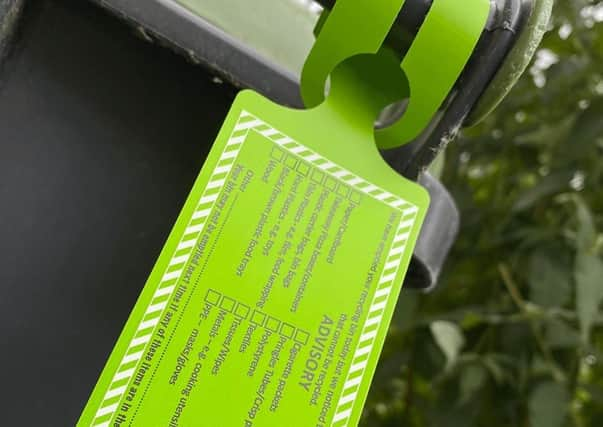Council calls upon North Kesteven residents to fight recycling bin ‘contamination


In a new era for recycling in the district, 419 tonnes of good quality paper and card were collected last week thanks to households making great use of their purple-lidded or purple bins to keep it clean and separate from other recycling.
The district council says it is now important that the problem of contamination in green-lidded bins is focused upon. The wrong items going in recycling bins is a growing problem across the county, and impacts on how much can be successfully recycled.
Advertisement
Hide AdAdvertisement
Hide AdThe next collection of green-lidded recycling bins will take place from Monday October 11. If a green-lidded bin contains the wrong things it cannot be emptied. If this happens a tag will be left by our teams indicating which items caused this.
Several wrong items in a bin can make the rest of the recycling inside it damp or stained and render items unusable. It is also about making sure other recycling collected on routes is not contaminated by it too, explains the council.
If a bin cannot be emptied because it is contaminated, the owner of the bin will need to remove the items contaminating it and present the bin at the next green-lidded recycling collection.
The wrong items found contaminating recycling bins include everything from soft plastics, crisp packets and film lids to used tissues and sometimes even nappies and dog waste.
Advertisement
Hide AdAdvertisement
Hide AdWhat can be recycled in green-lidded bins has not changed - aside from that the council now ask you to put clean, dry paper and cardboard in your purple-lidded or purple bin only (unless it is damp, soiled or shredded and therefore needs to go in the black bin where it will be burned and made into electricity from waste).
Recycling can be complex, with so many materials and items out there. It is easy to make mistakes, and the council says staff will help and give advice where they can on their rounds next week. The Right Thing Right Bin leaflet at
www.n-kesteven.gov.uk/recycling has lots of information to help households make sure the items in their green-lidded bins are the right ones. There is also an A-Z of recycling on the same link, and more is being shared on the council’s
social media channels @northkestevendc and via e-newsletter at www.n-keteven.gov.uk/stayconnected
So, what cannot go in green-lidded bins?
Advertisement
Hide AdAdvertisement
Hide AdAt a glance, items which must not go in green-lidded bins include:
Paper and cardboard (such as paper, magazines, newspapers, greetings cards without glitter/foil, cereal packets, household packaging, etc. These should go in your purple or purple-lidded bin only, or in the black bin if damp, soiled or
shredded), never the green-lidded bin.
Any takeaway packaging (black bin only for this, even if it looks clean, unless it is clear or light plastic which is rinsed and dry).
Tissues or kitchen roll (black bin only).
PPE such as masks (black bin only for these, bagged).
Batteries or electrical items (these should not go in any household bins as they cause a hazard, but taken to your local recycling centre instead).
Advertisement
Hide AdAdvertisement
Hide AdSoft plastics such as plastic bags and bread bags (these can go instead to soft plastics collection points at various shops and supermarkets or the black bin if not possible).
Polystyrene (black bin only for this).
Clothes/textiles (these can go to your recycling centre or donation points, or if not possible can go in the black bin as a last option).
Food pouches and crisp packets (local Terracycle schemes may be able to help, or put in the black bin if not possible).
Black or brown plastic food trays (black bin only).
Hard plastics e.g. old toys, plant pots (these are best being donated if in good condition, taken to your local household recycling centre or if not possible then the black bin as a last option with all batteries removed).